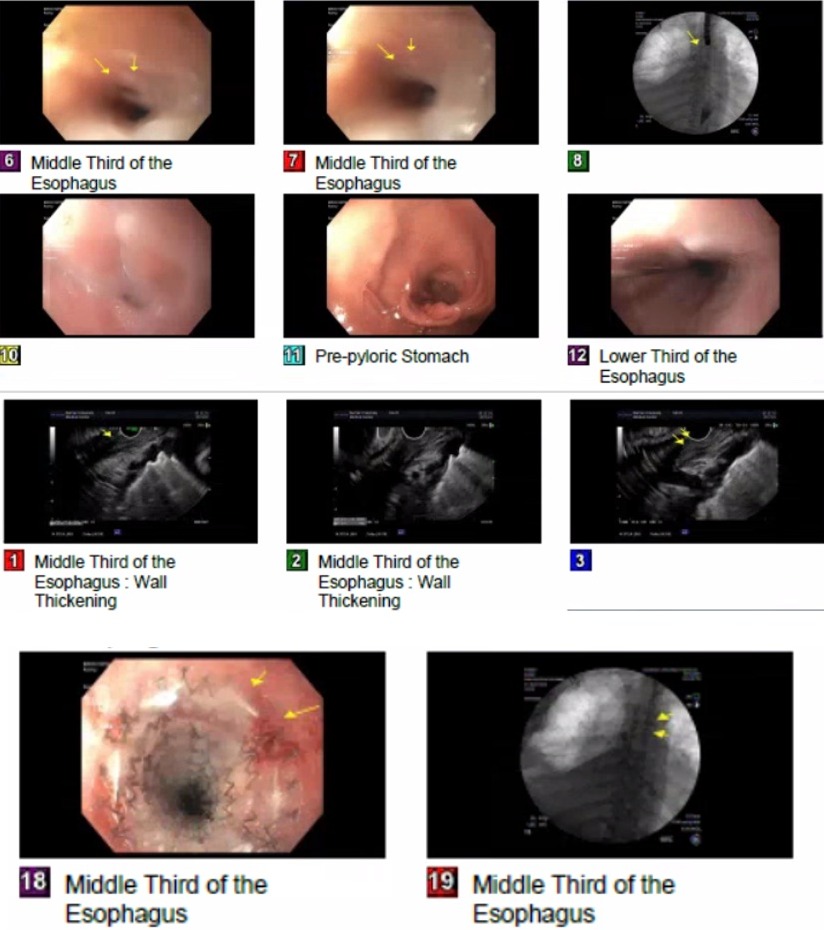Back


Poster Session C - Monday Afternoon
Category: Esophagus
C0236 - Malignant Dysphagia in Latent Triple Negative Metastatic Breast Cancer
Monday, October 24, 2022
3:00 PM – 5:00 PM ET
Location: Crown Ballroom

Has Audio
- BM
Bridgette McNally, DO
University of Arizona College of Medicine, Banner University Medical Center
Phoenix, AZ
Presenting Author(s)
Bridgette McNally, DO1, Sakolwan Suchartlikitwong, MD1, Nael Haddad, MD2, David Drewitz, MD3, Teodor C. Pitea, MD4
1University of Arizona College of Medicine, Banner University Medical Center, Phoenix, AZ; 2University of Arizona College of Medicine, Phoenix, AZ; 3Arizona Digestive Health, Phoenix, AZ; 4Interventional Endoscopy Associates, Scottsdale, AZ
Introduction: Luminal gastrointestinal metastasis of breast cancer is rare and esophageal metastasis from breast cancer is reported in less than 100 cases. We present a unique case of metastatic esophageal cancer from a primary breast malignancy, 20 years post initial diagnosis.
Case Description/Methods: A 79-year-old African American female with past medical history of triple negative metastatic breast cancer, COPD, HTN, & T2DM presented to the hospital with 3 weeks of progressive dysphagia to liquids & solids, regurgitation and 10kg weight loss. No heartburn, nausea/vomiting or change in bowel habits. No prior EGD and colonoscopy many years ago showed 2 benign polyps. She was diagnosed with breast cancer in early 2000s and underwent right mastectomy; recurrence was discovered in 2014, which led to lumpectomy, chemotherapy/radiation. Vital signs stable on arrival. Physical examination notable for cachectic female; no lymphadenopathy, abdominal distension/tenderness or edema. Labs showed: WBC 7.9, Hb 11, MCV 82, Plt 291. EGD, showed severe stenosis in the mid-esophagus – dilation was attempted, but unsuccessful; biopsies were negative. Esophogram revealed severe stenosis of the mid-esophagus. CT thorax demonstrated a focal density in the mid-esophagus & multiple hepatic lesions concerning for metastasis. Endoscopic ultrasound (EUS) revealed severe stenosis of mid-esophagus; dilation, fine needle aspiration (FNA) and stent placement were performed. Pathology demonstrated metastatic triple negative breast cancer. The patient planned to start paclitaxel but was placed on hospice.
Discussion: Esophageal metastasis of breast cancer has a prevalence of 0.59-5.9%. The most common presenting symptom is dysphagia. Studies describe a latency period between the diagnosis of breast cancer and symptoms of esophageal metastasis. Diagnosis is difficult as mucosal involvement is rare and most cases will present with stricture and normal mucosa. EUS with FNA is necessary to confirm diagnosis. Some success has been shown with expandable stents for symptomatic relief as dilation is limited by high risk of perforation. As in our case, esophageal metastasis is usually part of multi-organ metastasis, so treatment aimed at the primary malignancy, but palliative in most cases. Concern for malignant dysphagia must be included in the differential for breast cancer patients presenting with dysphagia. Due to difficult diagnosis and latency period, more routine screening with EUS may be beneficial.

Disclosures:
Bridgette McNally, DO1, Sakolwan Suchartlikitwong, MD1, Nael Haddad, MD2, David Drewitz, MD3, Teodor C. Pitea, MD4. C0236 - Malignant Dysphagia in Latent Triple Negative Metastatic Breast Cancer, ACG 2022 Annual Scientific Meeting Abstracts. Charlotte, NC: American College of Gastroenterology.
1University of Arizona College of Medicine, Banner University Medical Center, Phoenix, AZ; 2University of Arizona College of Medicine, Phoenix, AZ; 3Arizona Digestive Health, Phoenix, AZ; 4Interventional Endoscopy Associates, Scottsdale, AZ
Introduction: Luminal gastrointestinal metastasis of breast cancer is rare and esophageal metastasis from breast cancer is reported in less than 100 cases. We present a unique case of metastatic esophageal cancer from a primary breast malignancy, 20 years post initial diagnosis.
Case Description/Methods: A 79-year-old African American female with past medical history of triple negative metastatic breast cancer, COPD, HTN, & T2DM presented to the hospital with 3 weeks of progressive dysphagia to liquids & solids, regurgitation and 10kg weight loss. No heartburn, nausea/vomiting or change in bowel habits. No prior EGD and colonoscopy many years ago showed 2 benign polyps. She was diagnosed with breast cancer in early 2000s and underwent right mastectomy; recurrence was discovered in 2014, which led to lumpectomy, chemotherapy/radiation. Vital signs stable on arrival. Physical examination notable for cachectic female; no lymphadenopathy, abdominal distension/tenderness or edema. Labs showed: WBC 7.9, Hb 11, MCV 82, Plt 291. EGD, showed severe stenosis in the mid-esophagus – dilation was attempted, but unsuccessful; biopsies were negative. Esophogram revealed severe stenosis of the mid-esophagus. CT thorax demonstrated a focal density in the mid-esophagus & multiple hepatic lesions concerning for metastasis. Endoscopic ultrasound (EUS) revealed severe stenosis of mid-esophagus; dilation, fine needle aspiration (FNA) and stent placement were performed. Pathology demonstrated metastatic triple negative breast cancer. The patient planned to start paclitaxel but was placed on hospice.
Discussion: Esophageal metastasis of breast cancer has a prevalence of 0.59-5.9%. The most common presenting symptom is dysphagia. Studies describe a latency period between the diagnosis of breast cancer and symptoms of esophageal metastasis. Diagnosis is difficult as mucosal involvement is rare and most cases will present with stricture and normal mucosa. EUS with FNA is necessary to confirm diagnosis. Some success has been shown with expandable stents for symptomatic relief as dilation is limited by high risk of perforation. As in our case, esophageal metastasis is usually part of multi-organ metastasis, so treatment aimed at the primary malignancy, but palliative in most cases. Concern for malignant dysphagia must be included in the differential for breast cancer patients presenting with dysphagia. Due to difficult diagnosis and latency period, more routine screening with EUS may be beneficial.

Figure: Figure 1. Repeat EGD with EUS & Fluoroscopic guided stent placement
Disclosures:
Bridgette McNally indicated no relevant financial relationships.
Sakolwan Suchartlikitwong indicated no relevant financial relationships.
Nael Haddad indicated no relevant financial relationships.
David Drewitz indicated no relevant financial relationships.
Teodor Pitea indicated no relevant financial relationships.
Bridgette McNally, DO1, Sakolwan Suchartlikitwong, MD1, Nael Haddad, MD2, David Drewitz, MD3, Teodor C. Pitea, MD4. C0236 - Malignant Dysphagia in Latent Triple Negative Metastatic Breast Cancer, ACG 2022 Annual Scientific Meeting Abstracts. Charlotte, NC: American College of Gastroenterology.

